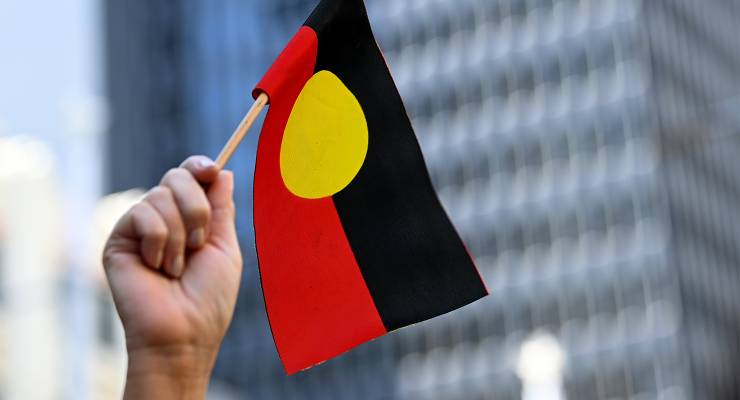
What was claimed
The Voice to Parliament proposal contradicts the Racial Discrimination Act 1975.
Our verdict
False. The Voice proposal is consistent with racial discrimination laws.
Social media posts claim the Aboriginal and Torres Strait Islander Voice to Parliament is at odds with Australia’s racial discrimination laws.
This is false. Experts told AAP FactCheck there is nothing illegal about the Voice proposal, which is in line with racial discrimination laws and international conventions.
The claim has spread widely on social media, as seen here, here, here and here, with posts alleging the Voice proposal and voting yes in the upcoming referendum is illegal under the Racial Discrimination Act (RDA).
Many of the posts reference sections nine and 10 of the RDA as supposed proof.
However, experts told AAP FactCheck the claims are bogus as the proposed advisory body wouldn’t restrict anyone’s rights.
They also point out the constitution, which needs to be amended to enshrine the Voice, is not subject to ordinary legislation like the RDA.
One Facebook post (archived here) claims: “The Racial Discrimination Act 1975 … clearly contradicts the Voice Referendum to such an extent that what Albo is trying to enshrine into the Constitution is nothing short of racial discrimination, and illegal,” referring to Prime Minister Anthony Albanese by his nickname.
“How can you even consider a Voice Referendum to alter the Commonwealth of Australia Constitution knowing that the very essence of the Voice Referendum flies in the face of the Racial Discrimination Act 1975 as well as the International Convention on the elimination of all forms of racial discrimination.
“Sect 10 will simply nullify the so called Voice under law…”
Another post (archived here) also references section nine of the RDA, as well as the Criminal Code Act.
“Read the Racial Discrimination Act 1975. It clearly states in sec nine that it is unlawful to favour one race over another,” it claims.
“Add to that, Albo is asking you to vote yes to the Voice, which, under the Criminal Code Act 1995 sec 11.4 is incitement, as he is asking you to unlawfully commit an act (voting yes) to discriminate and favour one race over another.”
The RDA makes racial discrimination in certain contexts unlawful. It was passed after Australia ratified the UN Convention on the Elimination of All Forms of Racial Discrimination.
Section nine allows a person to complain that they have been subject to treatment, on the basis of their race, that limits their rights.
Dr Bill Swannie, an expert in anti-discrimination law at the Australian Catholic University, told AAP FactCheck that to breach this section, the Voice would need to restrict the human rights or fundamental freedoms of non-Indigenous people.
“It is not clear that the Voice proposal does this, as it does not take away any consultative or advisory access that non-Indigenous people have to Parliament,” Dr Swannie said.
Simon Rice, a professor of law at the University of Sydney, agreed.
“A law that allows a body to make representations to the Parliament and executive on matters relating to Aboriginal and Torres Strait Islander peoples is not treatment of a person, on the basis of their race, that limits their human rights,” Professor Rice told AAP FactCheck.
Section 10 of the RDA guarantees rights to equality before the law.
Prof Rice said this section could invalidate laws that had a limiting effect on the human rights of a particular race.
“Even if the constitution were subject to the RDA (which it is not), the Voice does not limit the human rights of non-Indigenous Australians,” he said.
“So, no, the claim that the Voice to Parliament proposal contradicts section 10 of the Racial Discrimination Act is not accurate.”
The constitution is not subject to ordinary legislation like the RDA because it is superior to federal and state laws.
Monash University Law Professor Paula Gerber told AAP FactCheck the Voice proposal included a constitutional amendment, not so that it could bypass the RDA, but to make it permanent.
“Previous Indigenous representative bodies have been cancelled at the whim of the government of the day,” Professor Gerber said.
Proffesor Gerber pointed to comments from race discrimination commissioner Chin Tan and the UN Committee on the Elimination of Racial Discrimination, which state the Voice proposal is in line with international conventions.
Dr Swannie also said advocating for the Voice to Parliament could not be considered incitement because the proposal was not unlawful under discrimination law.
“This is an inflammatory and inaccurate statement,” he said.
The verdict
Claims the proposed Voice to Parliament breaches the Racial Discrimination Act 1975 are false.
While the constitution is not subject to ordinary legislation, experts told AAP FactCheck the Voice would not breach discrimination laws even if it was because it would not limit the rights of non-Indigenous people.
False: the claim is inaccurate.








Reasonably clear and accurate analysis that is sadly, somewhat futile as those posting against the voice in the socials are disingenuous and are not interested in facts.
Still it gives the rest of us some actual references to use against them.
The miserable nay-sayers seem to find no end in making up reason to oppose The Voice. If the referendum passes we can assume they will attempt a Constitutional challenge as part of their disruptive ways. it is sad that they cannot accept a simple straight forward proposal that hurts no-one. They have too much time on their hands.
More like too much bigotry in their minds and hate in their hearts.
If the “voice” is successful it might be worth looking at a voice for other penurious disadvantaged groups such as the aged, the unemployed, the disabled, children etc. These are all treated as onerous costs and forced to bear cutbacks whenever the billionaires look like losing a few bucks. Not the way it should be.
But lets get the “voice” up first.
Of course the Voice has no relationship to the Racial Discrimination Act – as it is an Act of Parliament all the government has to do is to insert a clause that it doesn’t – pointless argument. Even though Voice gives a small segment of the population more rights than the rest of the population.
What, like the rights enjoyed by all of those corporate lobbyists who get unfettered access to our parliamentarians?